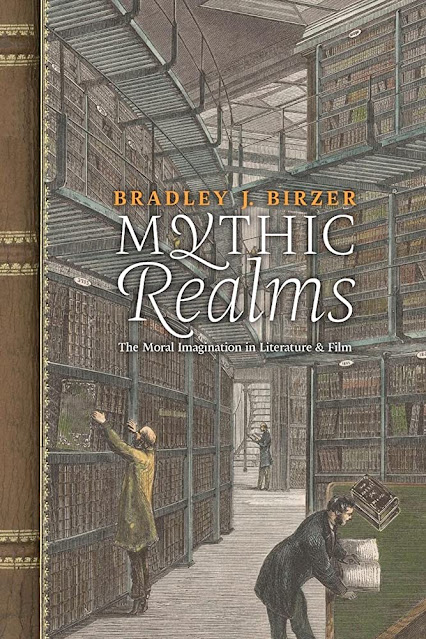Hillsdale College history professor Bradley Birzer is a co-founder of The Imaginative Conservative website, which I read daily and have often featured in my weekly Saturday Good Reads. I also read and reviewed his Beyond Tenebrae: Christian Humanism in the Twilight of the West.
What I didn’t know was how closely his literary influences (and reading) tracked with my own until I read his newest work, Mythic Realms: The Moral Imagination in Literature & Film. It was almost like reading a list – a long list – of books and writers that I had read myself.
Ray Bradbury and his The Illustrated Man and The October Country, and his wonderful Something Wicked This Way Comes. Tolkien. George Orwell. Leon Uris and his Mila 18 and Armageddon. Sherlock Holmes. Willa Cather. A biography series on famous Americans (where I, too, first learned about Lewis and Clark). Stephen King’s Salem’s Lot. Pulp fiction. Science fiction writer Arthur Clarke (whose Childhood’s End is one of the best novels of the 20th century) (in my own opinion).
But the influences don’t story there. His childhood Mecca was the Hutchinson, Kansas, Public Library, 2.4 miles from his home and where his mother allowed him to ride his bike. Mine was the Kenner, Louisiana, Public Library, about 1.5 miles from my home on one of the busiest highways in the New Orleans area at the time and less than a mile from the airport. My mother allowed me to ride my bike there; I had a library card in first grade (just like Birzer).
 |
| Bradley Birzer |
Mythic Realms is a collection of articles, essays, lectures, and book and film reviews Birzer has written over the years and which have appeared in a variety of publications and venues. While our literary influences are remarkably similar, we diverge on most of the films and television series he covers. That’s likely a reflection of the roughly 15 years difference in our ages. Except for the films of Alfred Hitchcock, Birzer’s cinematic influences and interests reflect the late 1970s, 1980s, and later. Mine reflect the 1960s, early 1970s (like Chinatown) and, at the latest, Chariots of Fire. My television preferences tend to the British productions.
Birzer writes with insight and verve. Even in short reviews, he sees things that most of us would miss, like finding national greatness in Cather’s O Pioneers! Or the significant contributions that pulp fiction have made to American literature, and how deeply conservative the tradition of Romanticism actually is.
Birzer holds the Russell Amos Kirk Chair in American Studies and is a professor of history at Hillsdale College in Michigan. He received a B.A. degree from the University of Notre Dame and his Ph.D. degree from Indiana University. He serves on the boards of the Free Enterprise Institute and the Center for Cultural Renewal and is a fellow or scholar with the Foundation for Economic Education, Intercollegiate Studies Institute, The McDonnell Center, and the Center for Economic Personalism. His books include In Defense of Andrew Jackson, Russell Kirk: American Conservative, J.R.R. Tolkien’s Sanctifying Myth, Sanctifying the World: The Augustinian Life and Mind of Christopher Dawson, American Cicero: The Life of Charles Caroll, Neal Peart: Cultural (Re)Percussions, and Beyond Tenebrae: Christian Humanism in the Twilight of the West.
I found myself over and over again in Mythic Realms. I discovered the influence of popular culture. I remembered my own years-long love affair with science fiction. And Birzer reminds us of just how much we share a culture and its films and literature, and why that’s important.
Related:

No comments:
Post a Comment